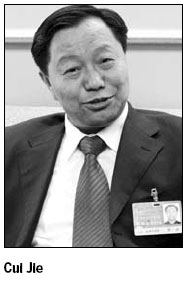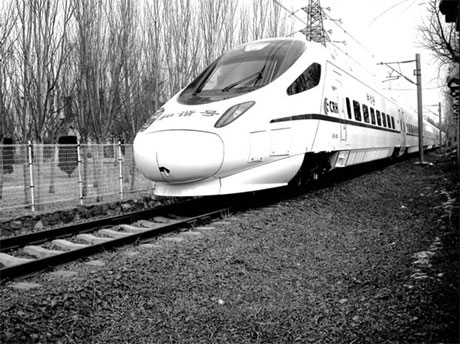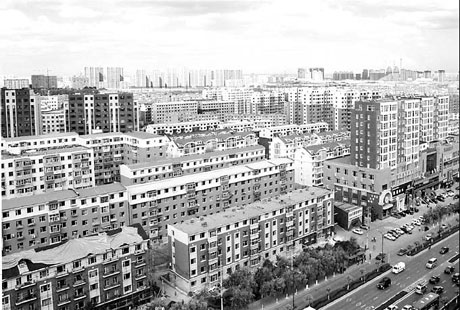News
Changchun mayor: Better quality of life needed
By Liu Mingtai (China Daily)
Updated: 2011-03-14 07:59
 |
Large Medium Small |
|
Among Changchun's achievements is a bullet train produced by China Northern Locomotive and Rolling Stock Industry Group. City leaders are now looking for greater social advancements. |
|
The local government started to renovate old apartments to better resist the cold last year. Photos provided to China Daily |
Changchun, capital of Northeast China's Jilin province, has registered such rapid economic growth in recent years that the city government is now shifting its emphasis to improved social welfare for residents starting from 2011, the first year of the 12th Five-Year Plan, said Mayor Cui Jie.
Cui made the remarks in Beijing last week on the sidelines the ongoing National People's Congress.
The mayor admitted that one of the problems his government faces is the lag in local incomes, which trail economic growth figures.
"Now it's time to solve the problem," he said, adding that the government will further promote employment, offer more assistance to low-income residents, lower taxes for individuals and owners of small firms, expand social security and lift the minimum wage for laborers.
Cui noted growing minimum wage "beneficiaries are either the low-income urban residents or the migrant workers from the countryside".
"We must ensure that there will be no more zero-employment families," added the mayor.
The government will also increase subsidies for low-income and underprivileged residents.
According to regulations that took effect on Jan 1, the subsidy for low-income families will grow 15 percent from last year, while the subsidy for disabled residents will increase by 20 percent.
In addition, government-offered unemployment insurance will increase from last year's 420 yuan a month to 574 yuan.
Cui said the income tax on household businesses has also been lowered, with the first 10,000 yuan now tax free. Before the levy began at 5,000 yuan.
He estimated that 40,000 businesspeople benefit from the new policy.
Fighting inflation

The mayor also admitted rising inflation is a widespread concern among locals.
The city's consumer price index (CPI) was 3.6 percent last year, lower than Jilin's average of 4.2 percent, but higher than the national rate of 3.3 percent.
"Rising commodity prices will affect people's living standard and will even influence social stability," Cui said, adding that the government is taking measures to stabilize the prices.
One initiative is to increase plantation of farm produce because food prices are the biggest contributor to the latest round of inflation.
The government has already cut the tax on vegetable transactions and offered subsidies for producers, transporters and traders.
"Underprivileged residents are always the first victims of inflation," Cui said.
"To help them overcome difficulties, we usually adjust the subsidy for them according to price fluctuations. Last year, we even offered free rice, flour and cooking oil," he added.
The mayor said he expects the CPI can be kept at 4 percent this year due to such measures.
Cui said another effort to improve the quality of life is increased investment in public services and facilities, including construction of affordable apartments for middle and low-income residents.
Cui said about 600 apartments with total floor space of 30,000 square meters will be built this year and sold to middle-income families at affordable prices.
In addition, about 10,000 apartments will be constructed and leased to low-income families.
The government will continue to renovate about 2 million square meters of outdated residential buildings for the urban residents.
Auto city
A famed auto city in China, Changchun itself now has far more vehicles on the road, which requires the government to improve traffic conditions.
"But we won't copy Beijing's experience in restricting the number of new car licenses," said the mayor.
He said measures to solve traffic congestion include more and better roads, enhanced traffic management and promoting the use of public transportation.
Home to auto giant FAW, its joint ventures and hundreds of component suppliers, Changchun is heavily reliant on the automotive industry.
But Cui noted the sector faces overcapacity in the near term.
"For the medium and long term, the industry is very promising because at present the number of families owning cars is still small in China," Cui said.
He said Changchun's auto industry is still expanding, but at a rational pace.
He predicted the city will have an annual production capacity of 3 million vehicles in the next five years.
The mayor also highlighted the railway equipment industry.
China has made astonishing progress over the past decade as it developed into a world leader in high-speed railways.
"Changchun, the nation's important production site of locomotives and rolling stock, is on its way to becoming a heavyweight in the global industry," Cui said.
Financed by the China Northern Locomotive and Rolling Stock Industry Group, a railway industry park in Changchun will start production by the end of this year, manufacturing 1,500 high-speed, 1,200 bullet trains and 3,000 subway trains yearly, according to Cui.
Cui said the output value from the railway equipment industry in the city is expected to exceed 30 billion yuan ($4.57 billion) this year, nearly triple that in 2010.
He predicted that by the end of 2015, railway equipment production in Changchun will be valued at 100 billion yuan.
(China Daily 03/14/2011 page23)
| 分享按钮 |

